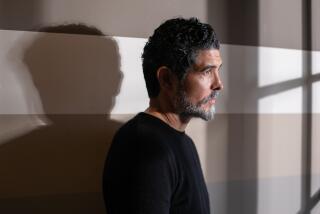A story that couldn’t stay locked up
Tears well in the eyes of director Neema Barnette as she pours out the story of the three years it’s taken to bring her first feature film, the urban women’s prison tale “Civil Brand,” to theaters. “A lot of things happened during this project, but I was determined to see it through,” she says.
Shortly before passing away, Barnette’s dying mother encouraged her to do the film. During the difficult shoot, members of the cast and crew came down with pneumonia. Barnette was taken to a hospital for exhaustion. After the company that agreed to finance the film changed hands, the production was shut down halfway through, and a year went by before she was able to cobble together a completed movie.
So no one was more surprised than Barnette when “Civil Brand,” a film she views as incomplete, began winning awards and playing festivals like Sundance and the American Film Institute. The movie, about a group of female inmates who take a stand against corrupt prison officials, opens Friday in Los Angeles. The film’s title has multiple meanings, referring to the numbers issued inmates upon imprisonment and the stigma ex-convicts face in society when released, as well as being a wordplay on the Sybil Brand Institute for Women, the Los Angeles County jail named for a prison activist and philanthropist.
Barnette, 45, a veteran director of television and theater, thought the original “Civil Brand” screenplay by Preston A. Whitmore II had an interesting premise, “but it wasn’t really the kind of script for me,” she says. “It was a ‘Caged Heat’ kind of thing,” with drug dealing and prostitution subplots. But Barnette was intrigued by a line in the script about a corporation visiting the prison.
Curious, Barnette did some online research and was amazed at what she learned: Major companies in this country are increasingly partnering with financially strapped prisons to employ inmates as cheap labor, sometimes in sweatshop-like conditions, paying them as little as $2 a day. Inspired, Barnette pitched a more socially conscious take on the project, and the producers approved. She brought on her screenwriter friend Joyce Renee Lewis to incorporate the issue into the script, and the two visited prisons and interviewed women who were currently or formerly incarcerated. For two of the roles in the film, Barnette recruited politically minded rapper-actors MC Lyte and Mos Def.
“We decided to do a switch and make it have something to say,” Barnette says. “We wanted to prove that hip-hop’s not only about bling-bling.” But the North Carolina Department of Correction, which had approved the original sex-and-violence-laden script to be shot in its facilities, withdrew its cooperation.
“When they said that this film didn’t represent them properly and I knew what the last script was about, I was really surprised,” Barnette says. “And then I knew I was on to something.”
The production relocated to the now-closed Tennessee State Penitentiary, where “The Green Mile” was shot. Temperatures at the unheated location fell below freezing during the shoot in December 2000. LisaRaye (“The Players Club”), who plays the main character, Frances, imprisoned for killing her abusive husband, says the cold inspired the actors to ad-lib.
“We would say, ‘More heat! It’s really cold in here! And it’s leaking in here!’ We used that.” But several cast and crew members came down with pneumonia, the camera would often freeze, and Barnette was hospitalized briefly.
She felt the set conditions were unsafe but that the story was important. “My instinct was to close down” the shoot, she says. “But I didn’t. I got up every day and I kept going.” That is, until the production was shut down on the 14th day of a shoot originally scheduled for 25 days.
“Civil Brand” initially was set up at Trimark, which was acquired by Lions Gate Entertainment shortly before production began. Barnette says Lions Gate slashed the $1.2-million budget in half, told her to cut out two main characters and halted production before the opening and closing of the movie had been shot.
She says she was told to salvage what she could in editing and that she would later get five days of additional shooting. Barnette felt passionate enough about the project that she waited a year in Los Angeles for the extra shooting to be approved. She says she was told she couldn’t accept any television directing jobs until “Civil Brand” was completed, forcing her to lease out her house to keep up payments and move into a cheaper apartment, where she remains.
Tom Ortenberg, president of Lions Gate Films Releasing, disputes that account. “Despite the fact that ‘Civil Brand’ actually went quite a ways over budget, Lions Gate was pleased to allow Neema to finish her film and to honor her artistic vision,” he says. “We are happy with the final outcome and are thrilled to be giving ‘Civil Brand’ its theatrical release.”
Barnette says she eventually was granted one additional shooting day. Some of the actors, however, were no longer available, so Barnette filmed newly written scenes with the supporting character played by Da Brat narrating parts of the story for use as a framing device, since the original beginning and ending couldn’t be shot.
“I had to work with what I had,” says Barnette, who saw the film as a challenge to market and expected “Civil Brand” would be released straight to video. Then the producers began submitting the film to festivals.
At the American Black Film Festival last year in Miami, “Civil Brand” won the $15,000 Blockbuster audience award. Barnette, who says she had been working on the film at her own expense at that point, laughs when she recalls Chris Tucker, Keenen Ivory Wayans and Robert Townsend presenting her with the check. “I said, ‘Is there a check-cashing place around?’ ”
At festival screenings, Barnette says she and other filmmakers encouraged audiences to write and e-mail Lions Gate to persuade the company to release the film in theaters. Barnette says after “Civil Brand” was accepted to last year’s AFI Fest, she finally got a meeting with Lions Gate.
Ortenberg, for his part, says, “Lions Gate has been more than stand-up in their dealings with Neema.” He says a variety of factors were behind the company’s decision to release the film. “We weighed our options, and we screened the movie and decided to take it out theatrically because it made sense to do so.”
“Civil Brand” is being released in about 30 theaters in Los Angeles as a test market before possible wider release. Barnette says she is thrilled that the movie is coming out at all.
“I’m sure that Lions Gate will take good care of it and do the best they can, and I’m really happy that they have gotten on board and [I’m] shocked,” she says.
Raised in Harlem, Barnette studied acting at New York’s High School for the Performing Arts before moving into directing for theater and then television. Barnette teaches directing classes at UCLA and USC and splits her time between Los Angeles and New York, where she and her husband, actor Reed R. McCants, who plays the warden in “Civil Brand,” run the theater company Live Theatre Gang.
“Civil Brand” is important, Barnette says, because “this little movie could reach those kids who don’t even know what they’re getting into when they think going to jail is hip.”
“I promised my mama that I would finish this movie,” she adds. “It was very difficult, but I was determined.”
More to Read
Only good movies
Get the Indie Focus newsletter, Mark Olsen's weekly guide to the world of cinema.
You may occasionally receive promotional content from the Los Angeles Times.










